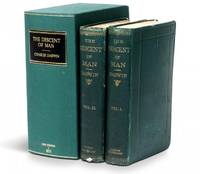signed first edition nb
1943 · Princeton, NJ
by EINSTEIN, ALBERT
Princeton, NJ: np, 1943. First edition. nb. Fine. EINSTEIN OFFERS STRONG AND PRESCIENT WORDS OF ENCOURAGEMENT TO THE LEADER OF THE NAACP IN THE FIGHT AGAINST RACIAL SEGREGATION AND DISCRIMINATION IN THE UNITED STATES. Background: Einstein's fight against racial discrimination in the United States:
The imperative "to protect the rights of the individual... was Einstein's most fundamental political tenet. Individualism and freedom were necessary for creative art and science to flourish. Personally, politically, and professionally, he was repulsed by any restraints.
"That is why he remained outspoken about racial discrimination in America... (truncated)
The imperative "to protect the rights of the individual... was Einstein's most fundamental political tenet. Individualism and freedom were necessary for creative art and science to flourish. Personally, politically, and professionally, he was repulsed by any restraints.
"That is why he remained outspoken about racial discrimination in America... (truncated)





![Autograph Letter Signed [ALS] to Joë Bousquet](https://d3525k1ryd2155.cloudfront.net/h/064/316/1693316064.0.m.jpg)